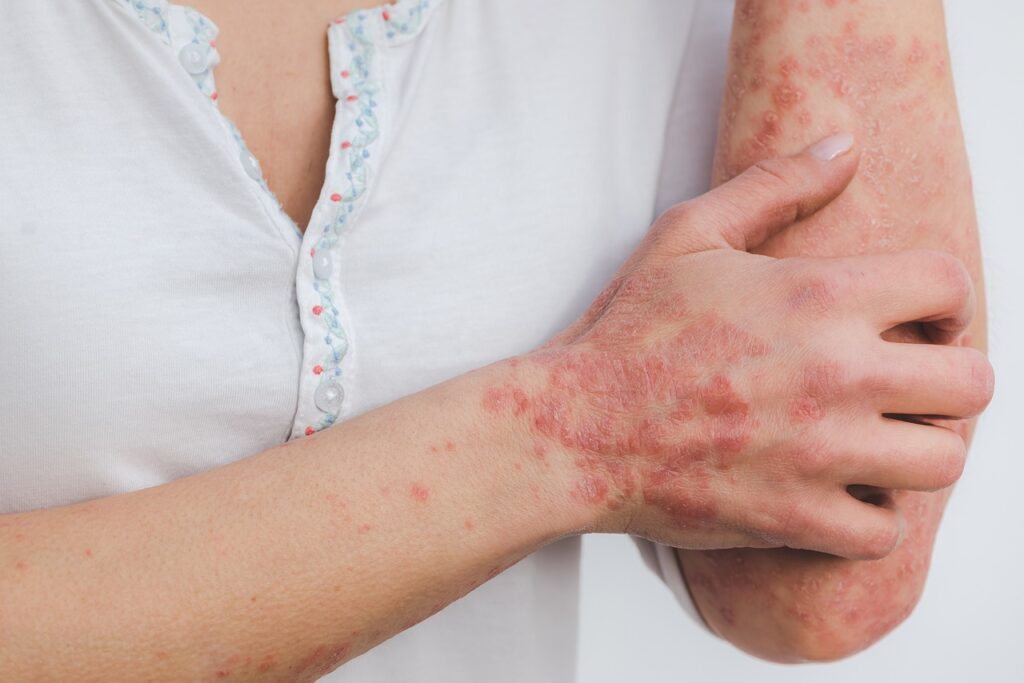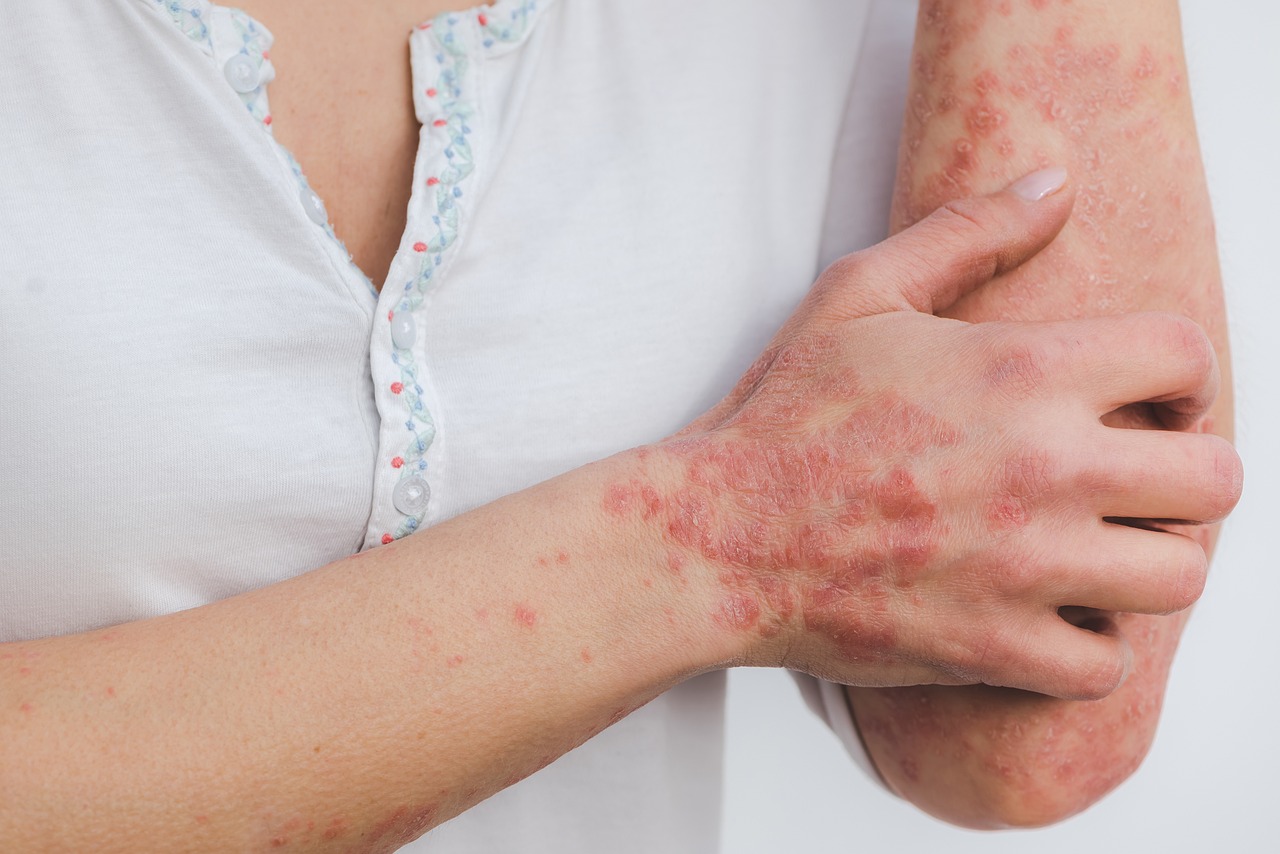Psoriasis, a conspicuous rash that affects millions of people worldwide, is a chronic skin condition that can cause discomfort and distress. In this article, we will explore the various causes behind the development of psoriasis, as well as the different treatment options available to manage its symptoms.
Additionally, we will discuss effective management strategies and preventive measures that individuals can adopt to keep psoriasis flare-ups at bay. Join us as we delve into the world of psoriasis, aiming to enhance your understanding of this condition and provide you with valuable insights on how to effectively cope with it.
1. Understanding Psoriasis
Psoriasis is a chronic skin condition that affects millions of people worldwide. Characterized by red, raised, and inflamed patches of skin covered with silver or whitish scales, psoriasis can be both physically uncomfortable and emotionally distressing. Understanding the causes, types, symptoms, and treatment options for psoriasis is important in order to effectively manage and prevent flare-ups.
2. Causes of Psoriasis
Genetic Factors
Research suggests that genetic factors play a role in the development of psoriasis. It is believed that certain genes related to the immune system and skin cells contribute to an individual’s susceptibility to the condition. People with a family history of psoriasis are more likely to develop the condition themselves.
Immune System Dysfunction
Psoriasis is characterized by an overactive immune system, specifically those that involve T cells. In individuals with psoriasis, these T cells mistakenly trigger inflammation and rapid skin cell turnover. This increased cell production leads to the accumulation of skin cells on the surface, causing the characteristic plaques and patches associated with psoriasis.
Environmental Triggers
While genetic factors contribute to the development of psoriasis, environmental triggers can also play a role in triggering flare-ups. Common triggers include infections (such as strep throat), injuries to the skin, certain medications (like beta-blockers and lithium), and weather changes.
Stress and Emotional Factors
Stress and emotional factors have been known to exacerbate psoriasis symptoms. Individuals who experience high levels of stress, anxiety, or depression may notice an increase in flare-ups. Additionally, the social stigma and self-consciousness associated with psoriasis can contribute to emotional distress, creating a cycle of worsening symptoms.
3. Types of Psoriasis
Psoriasis can manifest in several different forms, each with its own characteristic symptoms and appearances.
Plaque Psoriasis
Plaque psoriasis is the most common form of psoriasis, accounting for about 80–90% of cases. It presents as red, raised, and inflamed skin covered with silvery or whitish scales. These plaques often appear on the elbows, knees, scalp, and lower back.
Guttate Psoriasis
Guttate psoriasis is characterized by small, drop-like lesions on the skin. It is often triggered by bacterial infections, such as strep throat. Guttate psoriasis primarily affects children and young adults.
Inverse Psoriasis
Inverse psoriasis primarily affects the folds of the skin, such as the armpits, groin, and under the breasts. It appears as smooth, red patches of skin and is exacerbated by friction and sweating.
Pustular Psoriasis
Pustular psoriasis is characterized by painful, red, and inflamed skin with pus-filled blisters. It can be localized to certain areas of the body, such as the hands and feet, or it can be widespread, affecting larger areas.
Erythrodermic Psoriasis
Erythrodermic psoriasis is a rare but severe form of psoriasis that covers large areas of the body with red, inflamed skin. It can cause severe itching and pain and requires immediate medical attention.
4. Symptoms of Psoriasis
In addition to the varying appearances of different types of psoriasis, there are common symptoms that individuals may experience.
Red, Raised, and Inflamed Skin
Redness, raised patches, and inflammation are hallmark symptoms of psoriasis. The affected skin may also feel warm to the touch.
Silver or Whitish Scales
Covering the red patches, silver or whitish scales are a characteristic feature of psoriasis. These scales may flake off or become more pronounced with scratching.
Dry and Itchy Skin
Psoriasis is often accompanied by dry skin that can become itchy, leading to further irritation and discomfort.
Burning or Soreness
In some cases, psoriasis can cause a burning or sore sensation on the affected areas of the skin.
Thickened or Ridged Nails
Psoriasis can also affect the nails, causing them to become thickened, pitted, or ridged. Nails may also separate from the nail bed.

5. Diagnosing Psoriasis
Diagnosing psoriasis typically involves a combination of physical examination, medical history review, and, in some cases, additional tests.
Physical Examination
A dermatologist will examine the affected skin to determine if it meets the criteria for psoriasis. The appearance and distribution of the lesions, as well as any associated symptoms, help in the diagnosis.
Medical History
Providing a detailed medical history is essential in diagnosing psoriasis. The dermatologist will inquire about any familial history of psoriasis, previous skin conditions, and any triggering factors that may have contributed to the development of the rash.
Biopsy
In some cases, a small sample of the affected skin may be taken for examination under a microscope. This can help confirm the diagnosis and rule out other skin conditions.
Skin Scraping or Cultures
If there is a suspicion of a fungal or bacterial infection contributing to the symptoms, skin scrapings or cultures may be taken for further analysis.
6. Treatment Options for Psoriasis
While there is no cure for psoriasis, there are various treatment options available to manage symptoms and improve quality of life.
Topical Medications
Topical creams, ointments, and lotions containing corticosteroids, vitamin D derivatives, coal tar, salicylic acid, or retinoids can be effective in reducing inflammation and restoring skin appearance.
Systemic Medications
For more severe cases of psoriasis that do not respond to topical treatments, systemic medications may be prescribed. These medications can suppress the immune system and decrease inflammation throughout the body.
Phototherapy
Phototherapy involves exposing the skin to controlled doses of ultraviolet light. This treatment can slow down the rapid skin cell turnover and reduce inflammation.
Biologic Drugs
Biologic drugs are a newer class of medications that specifically target certain parts of the immune system involved in psoriasis. They can effectively reduce inflammation and provide long-term symptom relief.
Oral Retinoids
Oral retinoids are derived from vitamin A and can help regulate skin cell growth and reduce inflammation. These medications are often prescribed for severe psoriasis cases.
7. Self-Care and Management of Psoriasis
In addition to medical treatments, there are several self-care strategies that can help manage psoriasis and reduce flare-ups.
Moisturising and Hydrating the Skin
Keeping the skin moisturized and hydrated is essential in managing psoriasis. Regularly applying moisturizers and avoiding harsh soaps can help soothe the skin and prevent dryness.
Avoiding Triggers
Identifying and avoiding triggers that worsen psoriasis symptoms can help minimize flare-ups. Common triggers include stress, certain medications, infections, and cold weather.
Stress Management
Finding effective ways to manage stress and reduce anxiety can have a positive impact on psoriasis symptoms. Engaging in relaxation techniques, such as meditation or deep breathing exercises, can be beneficial.
Regular Exercise
Regular exercise has been shown to improve overall health and well-being, including the management of psoriasis. Exercise can help reduce stress, boost mood, and promote a healthy immune system.
Healthy Diet
Maintaining a balanced and nutritious diet is important for overall skin health and managing psoriasis. Foods rich in omega-3 fatty acids, antioxidants, and vitamins can be beneficial.
8. Preventing Psoriasis Flare-Ups
While it may not be possible to completely prevent psoriasis flare-ups, there are measures individuals can take to reduce their frequency and severity.
Protecting Skin from Injuries
Avoiding injuries to the skin, such as cuts, scrapes, and sunburns, can help prevent flare-ups. Minor trauma to the skin can trigger psoriasis lesions.
Maintaining a Healthy Lifestyle
Leading a healthy lifestyle, including regular exercise, balanced diet, and adequate sleep, can support overall skin health and reduce the risk of flare-ups.
Using Gentle Skincare Products
Using gentle skincare products that do not contain harsh chemicals or irritants is important for individuals with psoriasis. Fragrance-free and hypoallergenic products are recommended.
Avoiding Excessive Sun Exposure
While controlled sun exposure can be beneficial for some individuals with psoriasis, excessive exposure can trigger flare-ups. It is important to protect the skin with sunscreen and appropriate clothing.
Avoiding Smoking and Alcohol
Smoking and excessive alcohol consumption are known to worsen psoriasis symptoms. Avoiding these habits can help minimize the risk of flare-ups.
9. Psoriasis and Mental Health
Psoriasis not only impacts the physical well-being of individuals but can also have substantial effects on mental health.
Psychological Impact of Psoriasis
Living with a visible skin condition like psoriasis can lead to emotional distress, self-consciousness, and decreased self-esteem. Individuals may experience feelings of embarrassment, shame, and social isolation.
Depression and Anxiety
The chronic and unpredictable nature of psoriasis can contribute to the development of depression and anxiety. Managing mental health alongside psoriasis is essential for overall well-being.
Support Groups and Counseling
Joining support groups or seeking professional counseling can provide individuals with psoriasis a platform to share their experiences, gain support, and learn coping strategies to manage the emotional impact of the condition.
Building Self-Esteem
Engaging in activities that promote self-confidence and self-esteem can help individuals with psoriasis improve their mental well-being. This may involve pursuing hobbies, practicing self-care, or seeking opportunities for personal growth.
10. Research and Future Perspectives
Ongoing research efforts aim to better understand the mechanisms behind psoriasis and develop more effective treatments.
Advancements in Understanding Psoriasis
Advancements in genetic research and immunology have shed light on the underlying causes of psoriasis. This knowledge is driving the development of targeted therapies for more effective treatment.
Potential Therapies and Treatment Breakthroughs
Emerging therapies such as small molecules, gene therapy, and targeted immunotherapies show promise in providing newer and more targeted treatment options for psoriasis.
Psychological Support and Mental Health Awareness
As the understanding of the impact of psoriasis on mental health grows, there has been an increased focus on providing psychological support and raising awareness about the importance of mental well-being in individuals with psoriasis.
In conclusion, understanding psoriasis involves recognizing its causes, identifying its different forms, being familiar with its symptoms, and exploring the variety of treatment options available. By adhering to self-care practices and adopting a comprehensive approach to managing the condition, individuals can minimize flare-ups, improve their quality of life, and cultivate a positive outlook despite the challenges posed by psoriasis. With ongoing research and increased support, the future of psoriasis management holds promise for improved therapies and greater awareness surrounding the importance of mental health in overall well-being.

